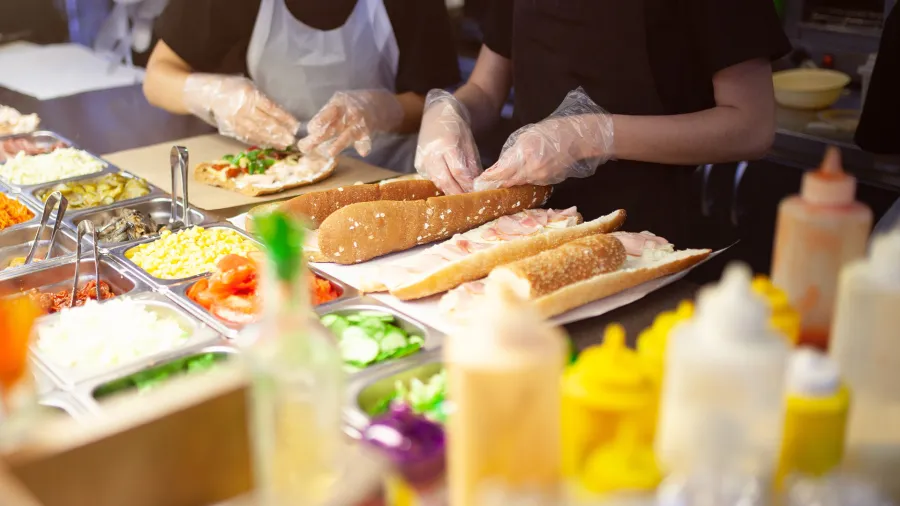Published • 24 Jul 2025
Hybrid schedules, dietary restrictions, rising costs, and elevated expectations—foodservice managers today face unprecedented complexity. But what if your toughest operational challenges could be solved more easily than you think?
Here's a look at five critical issues dining managers grapple with every day, and the surprisingly simple strategies successful operators are using to overcome them.
1. Inefficient Catering Order Management
Many foodservice operations still handle catering through manual processes, such as spreadsheets, shared email inboxes, or handwritten notes. These outdated methods cause confusion, missed details, and costly mistakes. Clients become frustrated, staff feel overwhelmed, and operational efficiency suffers.
Imagine your team juggling a wave of catering orders through cluttered inboxes. Change requests pile up, dietary details are missed, and invoicing becomes cumbersome. According to industry insights, catering managers can spend up to 20 extra hours per week simply managing order confirmations, approvals, and corrections—time that could be better spent serving clients and enhancing quality.
Smart Solution: Automating with 365 Catering Software
Transitioning to 365 Catering, a cloud-based catering solution, drastically reduces complexity. Clients place orders directly via your branded digital platform, streamlining approvals, billing, and communications. Organizations that have embraced similar automated solutions report an 87% reduction in catering administration time, which directly translates into fewer errors, reduced stress, and happier customers.
Key takeaway:
Automating your catering management process means less chaos, greater accuracy, and more time to deliver exceptional service.
2. Managing Dietary Requests and Allergen Compliance
Today’s diners expect more than one-size-fits-all. Personalization, whether it's for vegan, gluten-free, or allergen-free diets, is not a bonus, but a necessity. For foodservice teams, managing complex dietary needs manually—through handwritten notes or last-minute spreadsheets—often leads to mistakes, confusion at delivery, and dissatisfied guests.
This issue goes beyond a simple customer service issue. According to Food Allergy Research & Education (FARE), approximately 33 million Americans have food allergies. One misstep on an ingredient label can pose a serious health risk, damage trust, and expose your operation to liability.
Smart Solution: Streamlined, Personalized, and Safe with 365 Catering + 365 Kitchen Management
365 Catering makes group orders easy to manage and deliver, automatically generating individually labeled meals that are customized to each guest’s dietary preferences. Built-in allergen tracking ensures your team knows exactly who ordered what, and why.
With 365 Kitchen Management, your allergen compliance becomes automated. Ingredient changes trigger instant updates across recipes, menus, and labels—so diners get accurate, real-time information without your team needing to lift a finger.
Key takeaway:
Personalization and food safety don’t need to be complicated. With the right tools, you can serve every diner confidently, at scale, on time, and without the risk.
3. Controlling Food Waste and Costs
Food waste significantly impacts profitability. According to the USDA and Feeding America, U.S. restaurants waste approximately $162 billion worth of food annually. Causes include inaccurate inventory management, incorrect recipe costing, and poorly managed ordering systems. The cost of this waste is rising, and environmentally conscious customers are increasingly rejecting it.
Manual tracking often results in costly mistakes: overordering, spoilage, and reduced margins.
Smart Solution: Digital Inventory Control and Cost Management with 365 Kitchen Management
365 Kitchen Management offers digital tools for precise inventory tracking, real-time recipe costing, and detailed waste analysis. This visibility enables operators to make smarter ordering decisions, control portions effectively, and pinpoint areas for improvement. Kitchens utilizing digital management systems report significant reductions in food waste, which improves both profitability and sustainability.
Key takeaway:
Digital kitchen management enables operators to minimize waste, optimize costs, and achieve sustainability goals.
4. Adapting to Changing Customer Expectations
Modern diners expect convenience, speed, and flexibility. The shift to hybrid work has made traditional cafeteria-style services less effective. Customers seek convenient ordering options, seamless experiences, and personalized service, which can be challenging for traditional operational setups to deliver.
Without adaptable, user-friendly technology, foodservice operations struggle to meet evolving consumer expectations, risking decreased participation and revenue.
Smart Solution: Modernizing Operations with 365Dining
Implementing modern technology platforms like 365Dining ensures your operation remains relevant. By integrating convenient online ordering, self-service kiosks, and flexible service models, your operation becomes more agile, customer-centric, and responsive. Embracing these technology-driven changes helps meet consumer expectations while supporting operational efficiency.
Key takeaway:
Upgrading to modern dining solutions helps your operation remain competitive, flexible, and aligned with customer expectations.
Thrive—Don't Just Survive—in Today's Foodservice Landscape
Modern foodservice challenges require modern solutions. Automating catering, personalizing customer experiences, streamlining allergen compliance, controlling waste, and adapting to changing expectations are critical steps to achieving operational excellence.
Embracing innovative solutions like 365 Catering and 365 Kitchen Management positions your operation not just to overcome these challenges, but to thrive in today's complex foodservice landscape.
Ready to learn more?
Contact us today to request information or schedule a demo and discover how 365 can help transform your operation.

